Image: A villager beside her destroyed house
Photographs: Tarun Vijay Tarun Vijay
Photographs: Tarun Vijay Tarun Vijay
Tarun Vijay, the Member of Parliament who has just returned from Ladakh, recalls the agony of a region devastated by last week's flash floods.
It was as if walking in a vast burial ground, almost like having a dialogue with death.
A deadly silence had enveloped us all.
No one was talking to each other. Not even the birds -- of solace, of tears of agony, or helplessness. Everything seemed to have frozen in Choglumsar.
Ladakh, a hub once full of life, joy and welcome to tourists coming from various corners of the planet, known as moonland for its sheer beauty and heavenly closeness to the Gods, and the land of the Sindhu (Indus) river and Buddha, its tranquility stands shattered today.
...
It was as if walking in a vast burial ground, almost like having a dialogue with death.
A deadly silence had enveloped us all.
No one was talking to each other. Not even the birds -- of solace, of tears of agony, or helplessness. Everything seemed to have frozen in Choglumsar.
Ladakh, a hub once full of life, joy and welcome to tourists coming from various corners of the planet, known as moonland for its sheer beauty and heavenly closeness to the Gods, and the land of the Sindhu (Indus) river and Buddha, its tranquility stands shattered today.
...
The army appeared like God
Image: Lord Buddha on the window of a house in ruins
I have been visiting Ladakh since 1996 as a convener of Sindhu Darshan (the Indus Festival) but I have never felt the deadly chill I did when I visited Leh this time to share the agony of my second home.
The army appeared like God to the people in distress, and so were the brave Ladakhis who stood firm in these traumatic times.
Rashtriya Swayamsevak Sangh workers, who were camping by sheer coincidence in Choglumsar, rushed to the site immediately.
Ladakh Buddhist Association workers were in the forefront providing relief everywhere, and so were Sikh, Christian and Muslim organisations.
The army appeared like God to the people in distress, and so were the brave Ladakhis who stood firm in these traumatic times.
Rashtriya Swayamsevak Sangh workers, who were camping by sheer coincidence in Choglumsar, rushed to the site immediately.
Ladakh Buddhist Association workers were in the forefront providing relief everywhere, and so were Sikh, Christian and Muslim organisations.
The stench is spreading in the city
Image: Army personnel extract the body of a young boy from the rubble
It will take at least a year for Leh to return to some semblance of normalcy, but it will always remain bruised.
The hospital does not have up-to-date medical equipment; not even a morgue.
The unidentified bodies are lying in the open, decomposing and spreading stench in Leh city.
Even when all was normal, post mortems were conducted in a garage.
The hospital does not have up-to-date medical equipment; not even a morgue.
The unidentified bodies are lying in the open, decomposing and spreading stench in Leh city.
Even when all was normal, post mortems were conducted in a garage.
'Floods?? In Ladakh?? What do you need this money for?'
Image: A trunk with memories among the rubble
"The state government didn't give us even a CAT scan machine, which was managed from the Tata Trust," Dorjey, the chief executive officer of the Ladakh Hill Development Council (the local administrative unit), said.
"We had applied for Rs 83 crore (Rs 830 million) for flood relief, offered by the Centre three years before, to the Jammu and Kashmir government. The minister in charge in Srinagar laughed it away saying, 'Floods?? In Ladakh?? What do you need this money for?'"
The Council applied to upgrade the local hospital into a 200-bed establishment under the government's National Health Mission. The proposal has yet to be approved.
"We had applied for Rs 83 crore (Rs 830 million) for flood relief, offered by the Centre three years before, to the Jammu and Kashmir government. The minister in charge in Srinagar laughed it away saying, 'Floods?? In Ladakh?? What do you need this money for?'"
The Council applied to upgrade the local hospital into a 200-bed establishment under the government's National Health Mission. The proposal has yet to be approved.
A critical area ignored
Image: The State Bank of India branch at Choglunsar was destroyed
An area of 48,000 sq km, with a border with China and Pakistan stretching from Skardu and Baltistan (illegally occupied by Pakistan) to Aksai Chin (under China's illegal occupation), Ladakh has borne the first brunt of war since the 1950s.
Its boys have won Maha Vir Chakras and many more wartime decorations for valour.
But government planners ignore all its demands for progress and infrastructure, looking at its population, a little more than 200,000 people.
But the bureaucrats do not understand that the area of this one district is more than Himachal Pradesh, Punjab or Haryana.
One revenue district often spreads out over 80 square km, with a road as long as 45 km needed to join two localities!
They sing the national anthem, but who cares?
Image: Relief camps in Leh
And because they don't pelt stones on army jawans, stand in respect for the tricolour, sing the national anthem in every school with pride and cries of Bharat Mata Ki Jai, they get the political boot from the secular establishment in Delhi.
"Money is spent like water to divide Buddhist society and political ravines created to weaken their voice," says one Ladakhi leader in bitterness. "They want us to turn like the Hurriyat and demand independence. Only then would our basic demands be met."
The memory of missing persons brings a sense of fear enveloped in trauma. In October, winter will bring more misery, the tents will not suffice.
"Money is spent like water to divide Buddhist society and political ravines created to weaken their voice," says one Ladakhi leader in bitterness. "They want us to turn like the Hurriyat and demand independence. Only then would our basic demands be met."
The memory of missing persons brings a sense of fear enveloped in trauma. In October, winter will bring more misery, the tents will not suffice.
Ladakh needs the warmth of belonging
Image: Ladakhi women show photographs of missing relatives in the hope they will be found some day
New houses can be built only next year when the summer begins in March-April.
Till then wrecked families will undergo emotional disaster over the missing bodies of dear ones.
Ladakh needs the warmth of belonging more than anything else.
Till then wrecked families will undergo emotional disaster over the missing bodies of dear ones.
Ladakh needs the warmth of belonging more than anything else.

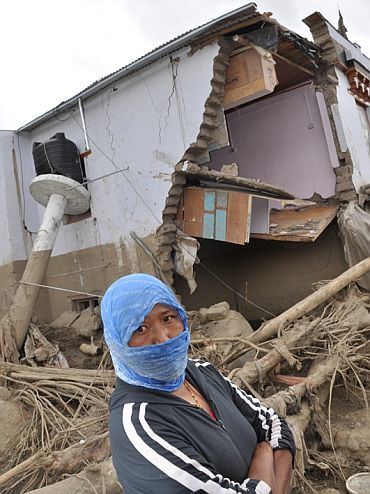
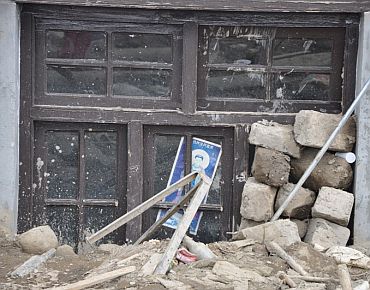
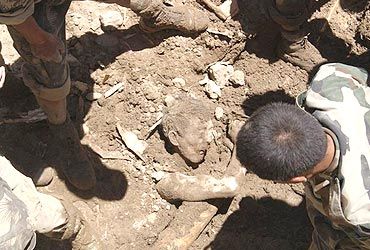
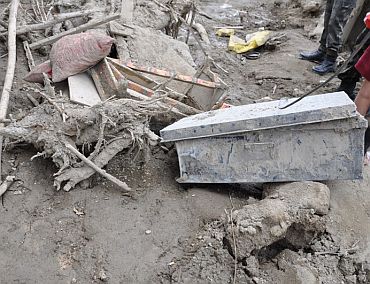
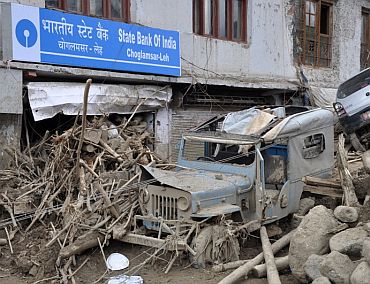
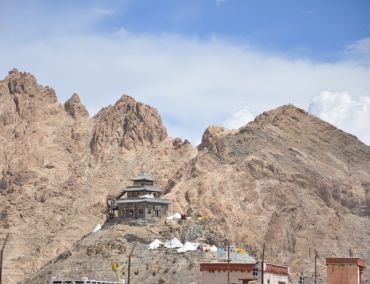

article